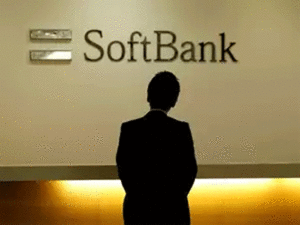 Agencies
AgenciesSoftBank has been holding discussions with a group of sovereign wealth and pension funds from the Far East and Gulf regions, some of whom are limited partners (LPs) of SoftBank Vision Fund, besides Silicon Valley based technology giants that are big buyers of clean energy, these people said.
The Japanese technology and telecoms major is considering various options, ranging from an outright sale of its 70% stake to a majority stake sale. In essence, it is looking at a partner which can provide equity commitments of $1.5-2 billion to execute and complete a pipeline of 7 GW of renewable projects around the world, the people said, adding more suitors may emerge. However, the talks are still at an early stage and may not result in a deal.
Analysts say SoftBank so far has invested $500-600 million in the Indian JV.

"As part of business strategy, we review all options to raise external capital, including strategic investments, from time to time. There is absolutely no plan to exit from the business,." Raman Nanda, CEO, SB Energy said a statement to ET.
Mails sent to Bharti and Foxconn did not generate a response till press time on Wednesday.
SUNRISE SECTOR
The clean energy platform predominantly has operating assets in India but has also globally diversified across US, Latin America and Middle East through acquisitions and bidding.
The entire global portfolio, except Japan — which is owned by a separate SoftBank entity — could potentially be divested.
“After Abu Dhabi Investment Authority (ADIA), Singapore’s GIC or the Canadian pension funds such as CPPIB and CDPQ, several of their peers from around the world like Mubadala are exploring the India clean tech space in a big way,” said one of the officials directly involved in the ongoing negotiations. “Many of them have relationships with the larger SoftBank Group or the Vision Fund and do not want to miss out.”
One of the people mentioned above said Silicon Valley giant Google would also be tapped but this could not be independently verified. Last September, Google had revealed a $2 billion wind and solar investment plan that included clean energy supply agreements worldwide.
GREEN & CLEAN
In 2015, amid much fanfare, SoftBank had teamed up with Bharti Enterprises and Taiwan’s Foxconn Technology Group to form a 70:10:20 alliance to build solar and wind parks and subsequently start manufacturing panels in India to promote Prime Minister Narendra Modi’s push for clean energy and Make in India initiatives. Together they were to invest $20 billion over a 10-year period to set up 20,000 MW, or 20 GW, of clean energy projects, subject to certain conditions.
But its India play so far has been mixed. It bid aggressively for contracts by Solar Energy Corporation of India (SECI) and NTPC to bulk up a portfolio of near 1.5 GWs of operating assets with a pipeline of another 2.5 GW. The operating projects have an estimated $900 million to a billion dollars of leverage, add industry players.
However, its plan of negotiating differentiated dollar power purchase agreements (PPAs) did not find favour with the Indian government. New Delhi did not accede to SoftBank’s demand to fix tariffs in dollars or for a central guarantee to buy electricity from its plants. This came as a setback to Son’s proposal to invest a staggering $1trillion by 2030. Plans by Foxconn to set up a manufacturing base is also yet to see the light of day. The Taiwanese tech giant in fact has not put in any equity into the alliance till date thereby making the JV a 80:20 venture between SoftBank and Bharti.
In 2018, power minister RK Singh even accused SoftBank (SB) Energy of attempting to cartelise and drive up solar power tariffs at the 3,000 MW solar auction in July. That October, SoftBank offered electricity free of cost to all countries part of the international solar alliance (ISA) once the PPAs expire after 25 years.
GLOBAL EXPANSIONS & ECLIPSE
Over the years the energy venture has expanded its footprint, bidding for projects in Abu Dhabi and Mexico. In November 2019, its subsidiary SB Energy Global Holdings announced it will acquire a portfolio of five US solar power plants with a combined capacity of more than 1.7 GW from Intersect Power with an aim to build, own and operate all the solar power plants located in California and Texas. “With this acquisition, SB Energy will have 7.2 GW of solar and wind projects under long-term contract in the US and India,” SB Energy CEO Raman Nanda said then.
“Their recent NTPC PPAs are mostly below Rs 4/unit. Their debt to EBITDA is 7 times while cost to revenue is 9 times,” said an Indian renewable company chef executive on condition of anonymity. “The market is valuing renewable players in India (Sembcorp, Renew, Mytrah) at 7-8.5 times multiples while top tier players like NTPC trades at 6 times… As a firm SoftBank is used to high returns while renewable projects are a low teens game.”
For years Son, nurtured a vision of building a global renewable energy empire of immense scale capable of carrying power across continents. Besides his promise to Modi, Son also announced plans to build as much as over 200 gigawatts in Saudi Arabia alone by 2030. But Saudi government shelved a $200 billion plan to build the world’s largest solar power generated project, the WSJ reported in 2018.
The royal family in Riyadh since then has backed ACWA Power, a developer, investor, co-owner and operator of energy assets and water desalination plants to generate more than 22 GW of power in the region.
Read More News on
Download The Economic Times News App to get Daily Market Updates & Live Business News.
Read More News on
Download The Economic Times News App to get Daily Market Updates & Live Business News.









 Get Unlimited Access to The Economic Times
Get Unlimited Access to The Economic Times
